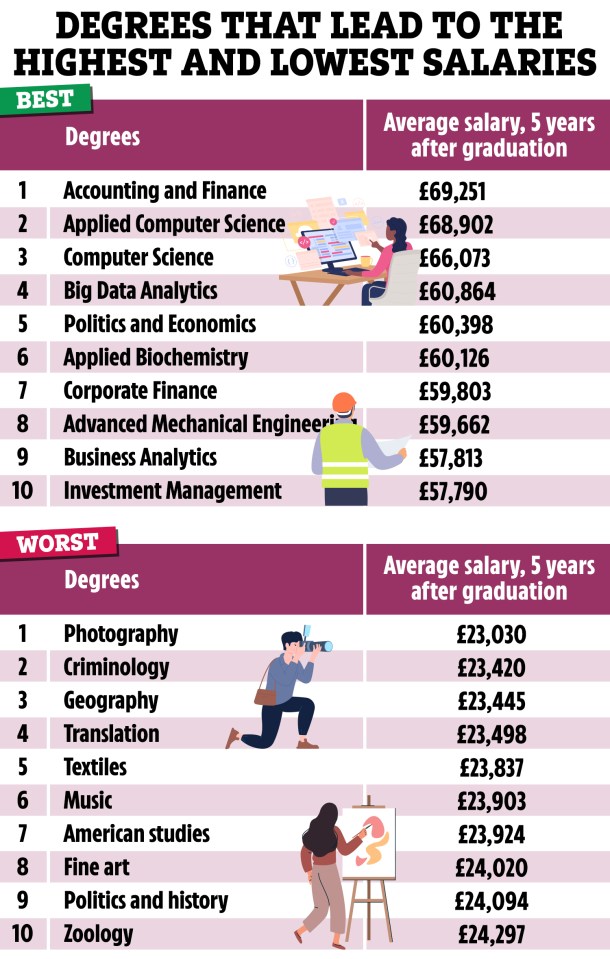THE cost of going to university reaches into the tens of thousands of pounds, so it pays to choose a degree that will pay the big bucks.
Below, we take a look at the best and worse courses for earning a high salary after graduation.
Adzuna has crunched the numbers to reveal which degrees offer the best – and worst – value for money.
The recruitment website analysed over 100,000 CVs from job seekers between 2020 and 2025 to find out how much they earned five years after graduation.
And six of the degrees will lead to a job with a salary of more than £60,000 within five years.
It comes as the cost of attending university soars, with the average student in England now expected to graduate with debt of £43,700.
But being laden with so much debt post-uni can have major consequences, including making it harder to buy a home and start a family.
If you’ve received your exam results today and are weighing up your options, our guide can help.
Which degrees lead to top-paying jobs?
Unsurprisingly, students who study STEM subjects (Science, Technology, Engineering and Maths) are most likely to pocket the best pay checks.
Students with Accounting and Finance are most likely to earn the most, and can expect to pocket up to £69,251 five years after graduating.
Close behind were graduates with Applied Computer Science degrees, who are looking at salaries of £68,902 five years post-uni.
Meanwhile, students with Computer Science degrees can bag £66,073 a year.
Big Data Analytics grads are looking at a post-uni salary of £60,864 after five years.
Hot on the heels are those with a Politics and Economics degree, then those with Applied Biochemistry – earning £60,398 and £60,126, respectively.
Corporate Finance, Advanced Mechanical Engineering and Business Analytics degrees all feature in Adzuna’s top 10 list as well.
Graduates with these qualifications are looking at yearly pay packets of £59,803, £59,662 and £57,813, respectively, after five years.
How to find the right job for you

Simon Fabb, CEO of ChiefJobs.com, shares his tips to help you find the right role.
Get experience
“Something I’d suggest every student do is start gaining relevant experience while they’re still studying.
“The job market is so oversaturated and having a degree on its own doesn’t hold the same weight it used to, so have a look for internships, part-time work, freelance projects and volunteering opportunities to bolster your CV while reading for your degree.
“Employers will want to see evidence of initiative and a real-world application of the skills you’ve been learning – especially is competitive sectors like tech or finance.”
Consider your location
“Graduate salaries can vary hugely depending on where you’re willing to work so have a think about location.
“Large cities and major hubs, particularly London and parts of the South East, tend to offer significantly higher starting salaries than other regions.
“Being flexible about location will gives you access to better-paid opportunities, especially in industries where demand is concentrated geographically.”
Look for remote jobs
“In some sectors, remote roles are now common at entry level too, which opens up national and even international job markets.”
Work on your communication skills
“Strong communication skills, confidence in interviews, adaptability, and a clear understanding of the role and company carry just as much weight.
“If you can demonstrate that you understand the specific challenges and goals of a business you’re much more likely to be offered higher starting package.”
Investment Management degrees will bag you a £57,790 a year salary too – not too shabby at all.
Which degrees lead to the lowest paying jobs?
Some degrees are worth swerving if a bumper salary is something you’ve set your sights on post-uni.
Students with a Photography degree are eyeing up a £23,030 a year pay packet five years after graduating.
Meanwhile, Criminology students are looking at an annual salary of £23,420, while Geography grads can expect £23,445.
Fancy taking up a degree in Translation? You could end up on just £23,498 after five years, according to Adzuna.
Textiles, Music and American Studies degrees will all see you earning £23,837, £23,903 and £23,924 a year, respectively.
Fine Art, Politics and History and Zoology students face salaries all under £25,000.
How can I make myself stand out?
Tailoring your CV and cover letter to the role you are after is one of the most important things to do.
Highlight your skills, experience and qualifications and make it clear that they match the job.
Emphasise what makes you the right candidate for the role.
In your cover letter and interview explain clearly why you are excited about the role, company and industry.
I’m using my music degree to get into marketing

MUSIC graduate Shakila Karim is using her degree to get a job in marketing.
The 27-year-old graduated from ICMP with a Music Degree in 2019.
Shakila had hoped to launch a successful music career and perform at venues across the UK, but the pandemic made this impossible.
Instead, she worked at her local Tesco and gave music lessons to students online.
When restrictions lifted she did several local performances, including at a charity gig in Bishop’s Stortford.
Shakila, from Hertfordshire, has now used her degree to get work experience in music marketing.
She said: “I worked for a year at a radio plugger service, which pitched new music to heads of music, producers and DJs.
“Now I’ve got marketing experience I’m trying to use it to find a full-time job in marketing.
“I want to make sure my skills are transferable across all marketing industries and find a full-time marketing job.”
You should also make it clear how your values align.
You can find this information on the company’s website and in the job description.
If you do not have the right experience, then emphasise the skills you do have.
Think teamwork, communication and problem-solving.
You can also mention soft skills such as time management, communication and resilience.
You can also highlight the ways that you have continued to learn and improve yourself.
This could be through courses or workshops at university or hobbies.
Do you have a money problem that needs sorting? Get in touch by emailing money-sm@news.co.uk.
Plus, you can join our Sun Money Chats and Tips Facebook group to share your tips and stories














